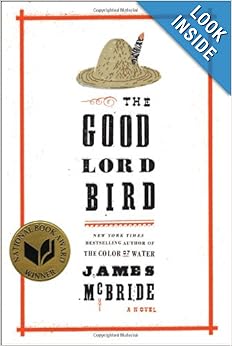The Good Lord Bird: A Novel, James McBride, 2013, Riverhead Books
Picked it up accidentally, but could not put it down until the last word!

Picked it up accidentally, but could not put it down until the last word! I saw it as I was running through an airport terminal and thought that it was the “Good Lord Bird” book assigned to my son’s class – it was not but I kept reading on despite being in the middle of another book.
McBride great narrative doesn’t sway from the point of view of a fictional African-American pre-adolescent boy’s older self, thus being able to churn out excellent observations of John Brown (the famous, white, monomaniacal abolitionist) and of the slavery John Brown was fighting. McBride’s chronological narration moves forward at a good clip, with gems like this: “That Sharps rifle, them old ones during that time, they barked so loud it was pity. That thing choked out some fire and offered up a bang so big you could hear it echoing all along the sides of both rivers; it bounced off them mountains like a calling from on high, the sound of that boom traveling across the river and bouncing down the Appalachian valley and up the Potomac like a bowling ball.”
With McBride, prayers of John Brown are hearth warming, even to an atheist, “Well into the wee hours, the Old Man [John Brown] gathered what was left of the Pottawtomie Rifles ‘round him to pray… Old Man called on the spirit of Jesus with an extra long spell of Old Testament and New Testament workings, hollering about the Book of John and so forth. He barked and prayed and howled at God forward and backward. They gathered ‘round him, … [S]haring a roasted squirrel with five other while the Old Man was hollering over the whole roasted business to the Lord for an hour before you could even get to the vittles, and even then there weren’t enough meat on it to knock the edges off the hunger you was feeling.” As you read it, you can smell that wet, rotten woods, a dried small carcass, and a group of folks listening to a prayer, their stomachs growling.
John Brown comes across as a force of nature: “[W]e was exhausted and hungry – except for the Captain [John Brown], who sprang up every morning bright as a bird, ready to go. It seemed like he didn’t need sleep. And food didn’t interest him in the least…” The book digs into the workings of John Brown’s monomaniacal mind, first he never holds others to his own high standards: “Old Brown never cared about the details of his army. I seen fellers walk off from his army one day, stay away a year, and a year later walk back into his camp and set down by the fire and eat like they had just come back from hunting that morning, and the Old Man wouldn’t say a word.” Second that his mindset wavered from reality: “[John Brown] reckoned every c**d wanted to fight for his freedom. It never occurred to him that they would feel any other way.” Yet his demise was as much his doing as those of he wanted to rescue, “Many a fool has done that, waiting for the N**o to do something, including N**o himself. And that’s gone on a hundred years. But [John Brown] didn’t have a hundred years.”
Our narrator is a multifaceted, conflicted character, not the least he finds it easier to pretend to be a girl after an initial mistake about his gender: “Lying came natural to me in them times. Trusty is, lying come natural to all N**s during slave time, for no man or woman in bondage ever prospered stating their true thoughts to the boss. Much of colored life was an act, and the N**s that sawed wood and said nothing lived the longest.” For the first couple of months of joining John Brown’s army involuntarily, book’s narrator thinks of running back to his master. Later on when stuck in Pikesville, he sometimes seems content: “I was back in bondage, true, but slavery ain’t too troublesome when you’re in the doing of it and growed used to it. Your meals is free. Your roof is paid for. Somebody else got to bother themselves about you. It was easier than being on the trail…”
McBride lays bare the contradictions of slavery “[T]he web of slavery is tricky business. And at the end of the day, ain’t nobody clear of it… C**d turned tables on one another all the time in them days, just like white folks. What difference does it make? One treachery ain’t no bigger than the other. The white man put his treachery on paper. N**s put theirs in their mouth. It is still the same evil.”
Within that “tricky business” slaves do their best to survive, would not we all? “Being a N**o means showing your best face to the white man every day. You know his wants, his needs, and watch him proper. But he don’t know your wants. He don’t know your needs or feelings or what’s inside you, for you ain’t equal to him in no measure. You just a n**r to him. A thing: like a dog or a shovel or a horse. Your needs and wants got no track, whether you is a girl or a boy, a woman or a man, or shy, or fat, or don’t eat biscuits, or can’t suffer the change of weather easily. What difference do it make? None to him, for you is living on the bottom rail.”
He comes down pretty hard on Frederick Douglass, the celebrity, African-American orator of the time: “But, standing there in his frock coat, Mr. Douglass weren’t up to it. He had too many highballs. Too many boiled pigeons and meat jellies and buttered apple pies. He was a man of parlor talk, of silk shirts and fine hats, linen suits and ties… He was a speeching parlor man… there weren’t no way Mr. Douglass could’a brung hisself to fight a real war.”
McBride crafted a book that is anything but a black-and-white morality tale.
Also on Amazon: http://www.amazon.com/review/R2YCMSJZC5S0U4





